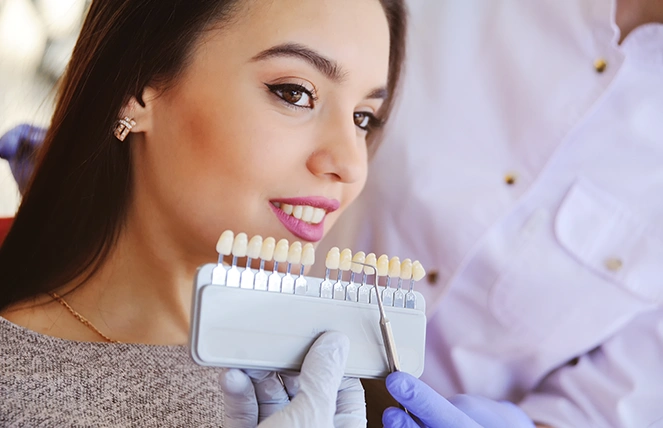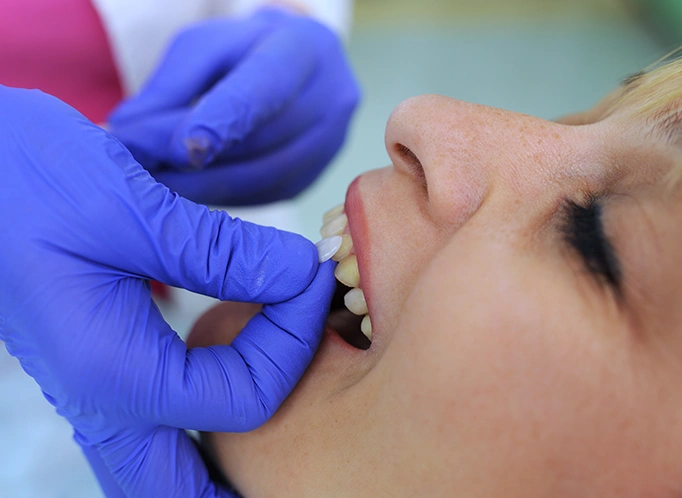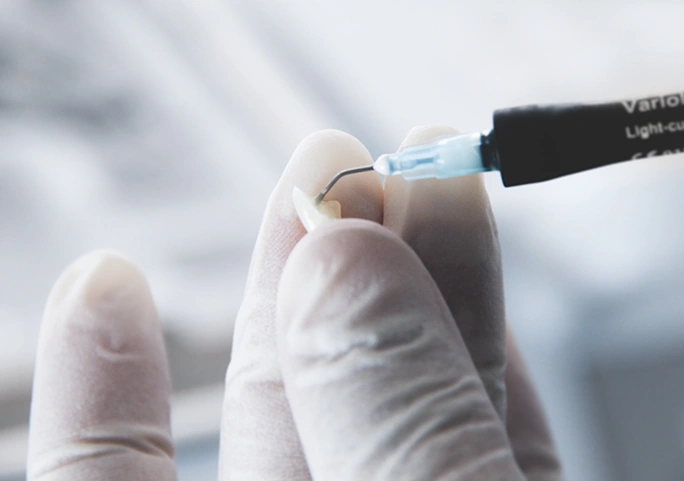Dental Veneers London
Dental veneers offer an instant solution to improve the look of your teeth and give you that beautiful, picture perfect smile you have always craved for. Your search for that beautiful smile ends right here with dental veneers! You can visit our clinic located in the heart of London to have a free consultation with one of our dental veneers experts.

Dental veneers, in vast majority of cases, are a cosmetic treatment with the aim of improving the colour, shape or position of your teeth. It can help the functionality of a tooth in case the tooth is broken or chipped.
Dental veneers are made from different materials. Some are made from porcelain and they are called porcelain dental veneers. Dental veneers made from composite resin based materials (similar to white filling materials), are generally known as composite veneers, or as composite bondings in North America.
Dental veneers can last for many years, but you need to remember that like natural teeth they also go through wear and tear, and they might get broken or chipped – think of a situation how your natural tooth might break and in such situations your veneer also might break. Porcelain veneers usually last around 7-10 years and composite veneers last for around 3-5 years, although with good maintenance and care they might even last longer.
What Is The Procedure For Getting Dental Veneers?
The first step for getting your dental veneers would be diagnosis and treatment planning, where the dentist will assess if the veneer option is suitable for the patient or other forms of treatment would be better. This may require doing mock ups of the veneers – giving you ‘trial smiles’ with temporary veneers or preparing wax-ups with a model of your teeth to show how your teeth will look when you are fitted with your dental veneers.

Modern porcelain dental veneers are very strong and durable. The veneers are made according to the unique needs of the patient. E-max veneers or Lumineers are ideal for cases that require very little or absolutely no drilling of teeth.
After the trial smile or wax-up procedure, impressions of your teeth are taken with conventional materials or in the form of digital impressions with scanners. Where it is possible and necessary, a copy of the veneers, based on the trial smile, known as provisional veneers, can be placed on your teeth till the arrival of the final veneers from the dental laboratory. Upon your satisfaction with the shape, the colour, the look and fit of the final veneers, they are cemented on your teeth, and you are ready to flash your confident smile.
On the other hand, composite veneers or bondings require lesser appointments than for fitting porcelain veneers and the final result can be achieved in a single visit. After assessments, planning and the trial smile, composite veneers are fixed. The composite resin material is directly cemented on your teeth, shaped, contoured, smoothened and finally polished, all in one sitting.
What Are The Advantages Of Dental Veneers?
Dental veneers have the following advantages:
Dental veneers give you a good aesthetic result and natural tooth appearance..
When multiple porcelain veneers are done, whiter colours can be used.
To compare with crowns, dental veneers require minimum or no drilling.
They are compatible with gum tissues and are tolerated well.
Porcelain veneers are resistant to stains.

What Are The Disadvantages Of Dental Veneers?
Dental veneers have the following disadvantages:
Porcelain veneers can come off or break or chip.
If your teeth have been drilled, the veneers are irreversible.
Dental veneers do not change colour with whitening.
Colour matching can be difficult if only one or two veneers are done.
Need for better oral hygiene is more crucial.
The veneers may have to be replaced after some years.
Age and trauma related gum recession can affect appearance.
People with clenching, grinding and other chewing habits are not the best candidates for dental veneers.
In the case of people with uncontrolled gum disease, dental veneers can exacerbate the problem.

Do Dental Veneers Need Special Care And Maintenance?
Take care of your dental veneers in the same way you are supposed to care for your natural teeth, with the usual cycle of brushing and flossing. There may be some diet limitations, because you might have to avoid biting into hard food that can cause damage to porcelain veneers.
Although porcelain veneers are unlikely to stain easily, it is better to rinse your mouth with water after having tea, coffee, or red wine, which are known to stain teeth. The same care guidelines apply to dental composite veneers, teeth bonding, and dental bonding treatments as well.
Although composite veneers used in dental bonding are more prone to picking up stains, they may still stain less than natural teeth. The golden rule for protecting teeth bonding and dental composite veneers is maintaining good oral hygiene and avoiding biting into hard foods.
What Are The Alternatives To Dental Veneers?
If you are not comfortable with porcelain veneers, composite veneers or bondings, or if the dentist has found them not suitable for you, you can choose alternatives to improve the look of your teeth. The alternatives include dental crowns, teeth whitening or orthodontics. Dental crowns are tooth-shaped porcelain caps that are fitted over the teeth to improve their appearance. Orthodontic treatment includes the fitting of metal braces, or any of the Invisalign procedures that requires fitting translucent plastic aligners over the teeth. Your dentist might suggest teeth whitening treatment if the problem is only stained or discoloured teeth.
How Much Is The Cost Of Dental Veneers?

Cost of dental veneers might vary from clinic to clinic. But generally direct composite veneers are less expensive than porcelain veneers. The cost of dental veneers at Bayswater Dental Clinic is published on our fees page. You might find it helpful to know how the fees are set in our clinic.
- Experience and skills of the person who is providing the treatment.
- Type and complexity of the treatment provided.
- Length of time needed to complete the treatment.
- Quality of the material used and the equipment needed.
- The quality and standard of the dental technicians and dental laboratories used.
- 0% finance up to 3 years available
- Free consultation available. Book online
- Monday 09:00AM - 08:00PM
- Tuesday 09:00AM - 08:00PM
- Wednesday 09:00AM - 08:00PM
- Thursday 09:00AM - 08:00PM
- Friday 09:00AM - 08:00PM
- Saturday 09:00AM - 08:00PM
- Sunday 09:00AM - 04:00PM






